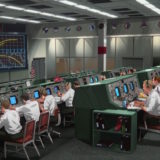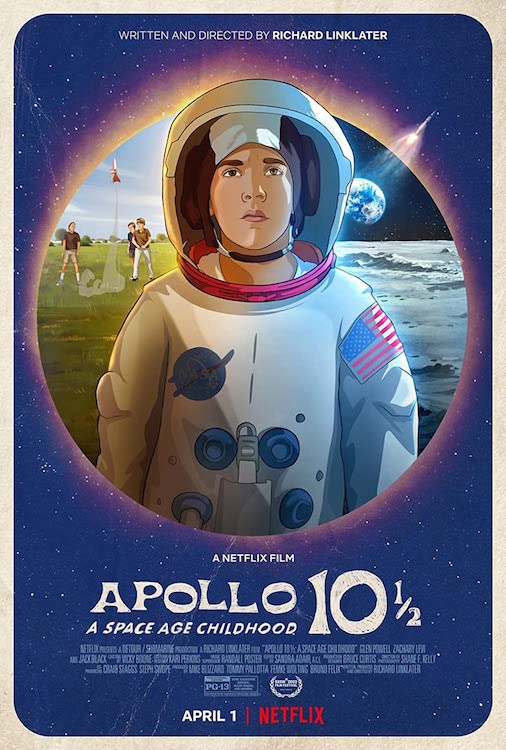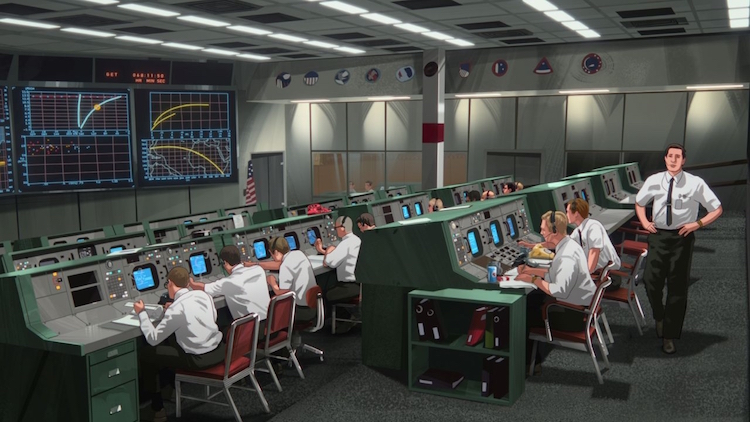
Movie Review: Apollo 10½: A Space Age Childhood
What We Liked
What We Didn't Like
It would be tempting to call Apollo 10½: A Space Age Childhood a collection of Richard Linklater’s greatest hits. The film is a casual look back at a specific time and place, like Dazed and Confused (1993) and Everybody Wants Some!! (2016). It employs the whimsical rotoscope-style animation of Waking Life (2001) and A Scanner Darkly (2006), and it makes effective use of Jack Black, who has done his best work with the director in School of Rock (2003) and Bernie (2011).
But the film is more than just a pastiche of Linklater’s trademarks. Instead, it’s an opportunity for the director to bring his unique abilities to a story that is deeply specific yet captures the mood of an entire generation. It’s a nostalgic ode to life at the center of the space race and a celebration of childhood, optimism and the complexities of growing up American.
Black narrates as Stan, an adult looking back at growing up in Houston during the summer of 1969. It’s a town with no past; subdivisions and business centers take rise in the middle of nowhere, with only the future in mind. Nearly every adult in Stan’s subdivision works for NASA, and all thoughts are on that July’s upcoming moon landing.
Stan has special insight into the moon landing: According to him, he was the first person on the moon. Approached by NASA scientists during recess, he is informed that the lunar lander was accidentally constructed at the wrong scale, and it can only accommodate a young boy. His grades and physical ability — particularly his performance in the Presidential Physical Fitness Test — make him an excellent candidate to get to the moon ahead of Neil Armstrong and Buzz Aldrin. Under cover of a summer camp trip, NASA begins training him for the mission.
It’s a fun entry point, rooted in Linklater’s own childhood fantasies. But the director quickly moves on after about 15 minutes, launching into an evocative look back at Stan’s life before NASA came calling. For the next hour, Stan engages in a leisurely and visually inventive reminiscence of life during the summer of the Apollo 11 mission, lingering lovingly on growing up in a town where the future was taking shape, while weaving in odes to the pop culture ephemera and childhood traditions that helped form him.
Families looking for kid-in-space hijinks might be disappointed; aside from the bookends about Stan’s space travels, Linklater keeps the film grounded on planet Earth. Some may find the meat of the story to be nothing more than a feature length, Netflix-funded exercise in nostalgia. But Black’s an engaging and wry narrator, and Linklater has a knack for creating glimpses back in time that are so specific and true that it’s a joy to luxuriate in his ramblings.
There were only three members of the Apollo 11 mission, and yet walking on the moon felt like a triumph for every American. Because nearly every person in Stan’s neighborhood has a NASA connection, the events of July 20, 1969, are a community accomplishment. Stan may not really have set foot on the moon, but by enveloping the story in the accounts of a self-described fabulist, Linklater captures the feeling that many shared: although only two men walked on the moon that day, everyone felt like they had been there.
In many stretches, Apollo 10 ½ is less interested in the moon than in the specifics of an American childhood. Stan affectionately recalls childhood antics in the backyard, his father’s constant attempts to save money, the movies that he fell in love with on summer afternoons, the television waiting for him in the evening and the music that provided a soundtrack to it all. Linklater rarely goes whimsical with the animation — this story could easily have been told in live action — but the visual approach makes it clear that this isn’t clear-eyed reality but memories filtered through the prism of nostalgia.
Linklater has a unique skill for looking back with clear eyes, and at the edges of an idyllic childhood are reminders of the tumultuous times in which the moon landing took place. It’s not just the causal abuse in schools, where any adult could paddle a kid, or the way that childhood freedom often led to injury. Growing up in the sixties brought its own unique complexities, as war and civil unrest competed with NASA for attention on the nightly news. Linklater uses the dynamic between Stan’s conservative parents and his more liberal siblings to tap into the tension felt in many households, which at once could celebrate the moon landing with wonder while arguing about whether money could have better been spent to help those on the ground.
In its best moments, Apollo 10 ½ captures the nostalgic appeal of The Sandlot (1993) and A Christmas Story (1983), albeit with a more subdued tone and less flights of fantasy (aside from the imaginative trip to space). It’s not a story about being a child so much as a story about childhood, told from the viewpoint of someone far removed from that time in their life. It’s warm and gently humorous enough that it’s never dull; it brings to mind listening to a great family storyteller talk about their own memories.
Apollo 10½ is specific by design; the Texas heat almost radiates from the screen, and the mustard yellows and olive greens of Stan’s home set the story in a very particular time and place. And yet, for those who grew up during the space race, the film will likely tap into their own youthful recollections. For those born after the fact, it’s a low-key but effective look at a time when the tumult of American life could also give way to optimism and hope, when the future was born live on TV. It’s a charmer that might be what viewers need in similarly uncertain times.




